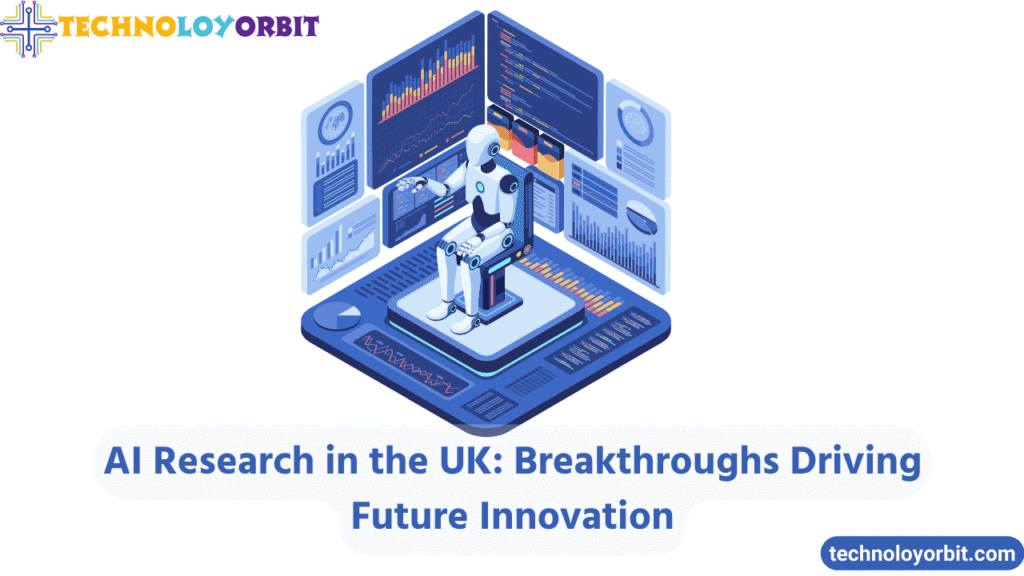AI research in the UK is advancing rapidly, with significant contributions from universities, research labs, and government initiatives, driving innovation in fields like healthcare, robotics, and machine learning.
Artificial Intelligence (AI) has become one of the most transformative technologies of the 21st century. The rapid development of AI has far-reaching implications, not just for the tech industry, but also for healthcare, education, finance, and nearly every other sector. In the United Kingdom, AI research is gaining significant momentum, with various institutions, research labs, and startups making strides in both fundamental and applied AI. This article delves into the current state of AI research in the UK, the challenges faced, the solutions provided, and the future outlook for this cutting-edge field. By the end of this article, you will have a comprehensive understanding of the AI landscape in the UK and its potential to reshape industries and societies.
Introduction to AI Research in the UK
The UK has been at the forefront of AI research for several years. As a global leader in science and technology, the UK government has invested heavily in AI development. The combination of world-class universities, cutting-edge research centers, and a thriving tech ecosystem makes the UK an ideal place for the advancement of AI technologies. AI research in the UK spans various subfields, including machine learning, natural language processing (NLP), robotics, and computer vision. Researchers in these fields are not only pushing the boundaries of AI capabilities but are also addressing key societal concerns such as ethics, privacy, and accountability.
Key Areas of Focus in UK AI Research

AI research in the UK is vast and varied, touching on multiple domains. Here are the key areas where AI research in the UK is making a significant impact:
- Machine Learning (ML): This is one of the most active research areas, focusing on algorithms that allow machines to learn from data and make predictions or decisions without explicit programming.
- Natural Language Processing (NLP): NLP research is particularly important for making AI systems capable of understanding, interpreting, and generating human language, which is key for applications like chatbots, voice assistants, and machine translation.
- AI Ethics and Fairness: As AI technologies become more integrated into our lives, ensuring their ethical use has become a central research focus. UK researchers are actively working on developing frameworks for fairness, accountability, and transparency in AI systems.
- Robotics: The UK is home to several cutting-edge robotic research labs, where AI is being applied to improve autonomous systems, manufacturing processes, and even healthcare.
- AI for Healthcare: Research in AI applications for healthcare, including drug discovery, personalized medicine, and diagnostic tools, is a rapidly growing field in the UK.
The Role of UK Universities in AI Research
One of the main pillars of AI research in the UK is the academic community. Leading universities like the University of Oxford, University of Cambridge, Imperial College London, and University College London (UCL) are at the heart of this research. These institutions not only conduct groundbreaking research but also provide high-quality education in AI-related fields. Here’s a look at how these universities are contributing to AI research:
University of Oxford and AI Innovation
The University of Oxford is home to the Oxford Artificial Intelligence Society, one of the largest and most prestigious AI research groups in the world. Researchers at Oxford focus on a variety of AI applications, from machine learning algorithms to ethical AI development. The university’s Department of Computer Science is a hub for AI research, with work ranging from deep learning to reinforcement learning. Oxford also collaborates with industry leaders to bring research innovations to real-world applications.
University of Cambridge: AI for the Public Good
The University of Cambridge is another major player in AI research. Cambridge researchers are focusing on developing AI technologies that can address global challenges, such as climate change, healthcare, and social inequality. The Cambridge Centre for AI in Medicine, for example, is working on AI-driven tools to improve patient care and accelerate medical research.
Imperial College London and AI in Healthcare
Imperial College London is well known for its contributions to AI in healthcare. The AI research at Imperial focuses on developing intelligent systems for clinical diagnostics, drug discovery, and personalized treatment plans. Imperial is collaborating with NHS trusts to bring AI innovations to the UK healthcare system, with the goal of improving patient outcomes and reducing healthcare costs.
Government Initiatives and Investment in AI Research

The UK government has recognized the transformative potential of AI and is making substantial investments to support AI research. In 2018, the UK government published its AI Sector Deal, which outlines its strategy for becoming a world leader in AI research and development. The deal includes funding for AI research centers, talent development, and initiatives to drive AI adoption across industries.
The AI Sector Deal and Its Impact
The AI Sector Deal, led by the Department for Business, Energy & Industrial Strategy (BEIS), is designed to accelerate the growth of AI in the UK. It includes investments in the following key areas:
- AI Research Hubs: The establishment of AI research hubs across the UK, which focus on advancing AI technologies and promoting collaboration between academia, industry, and government.
- Funding for Startups: The government has committed to providing funding for AI startups, helping to foster innovation in the private sector.
- Talent Development: Recognizing the need for a skilled workforce, the government has invested in educational programs to train the next generation of AI experts.
- AI Adoption in Public Services: The government is working on adopting AI solutions in public services such as healthcare, transport, and education to improve efficiency and reduce costs.
The Role of AI Research Labs and Companies in the UK
In addition to academic institutions and government initiatives, AI research in the UK is also driven by private companies and research labs. These organizations play a crucial role in translating academic research into practical applications that can be used in industries such as finance, healthcare, and entertainment.
DeepMind: A Leader in AI Research
One of the most well-known names in AI research in the UK is DeepMind, a subsidiary of Alphabet (Google’s parent company). DeepMind has been at the forefront of AI research, making groundbreaking contributions in areas such as reinforcement learning and neural networks. The company’s achievements, including AlphaGo (which defeated human champions in the game of Go), have brought significant attention to the potential of AI to solve complex problems. DeepMind’s research is not limited to gaming; the company is also working on applying AI to real-world challenges such as healthcare, energy efficiency, and scientific research.
Other Key AI Companies in the UK
Apart from DeepMind, the UK is home to several other AI companies and startups that are making strides in various sectors. Some of the prominent AI firms in the UK include:
- Darktrace: A cybersecurity company that uses AI to detect and respond to cyber threats in real-time.
- Babylon Health: A health-tech company leveraging AI to provide medical consultations through a mobile app.
- Tractable: An AI company focused on using computer vision to assess vehicle damage for insurance claims.
Ethical Challenges in UK AI Research
As AI technology becomes more powerful, ethical concerns have also emerged. Researchers in the UK are actively addressing these concerns by developing AI systems that are fair, transparent, and accountable. Here are some of the key ethical challenges in AI research:
- Bias in AI: AI systems are trained on data, and if the data used is biased, the resulting AI systems may also be biased. This can lead to unfair decisions in areas such as hiring, law enforcement, and healthcare. Researchers in the UK are working on techniques to detect and mitigate bias in AI models.
- AI and Privacy: With AI systems collecting and processing vast amounts of personal data, privacy concerns have become a significant issue. Ensuring that AI systems comply with privacy laws and respect individual rights is a priority for AI researchers in the UK.
- Accountability: As AI systems become more autonomous, determining who is responsible for their actions becomes a complex issue. UK researchers are exploring frameworks for accountability in AI decision-making.
Future Outlook for AI Research in the UK

The future of AI research in the UK looks promising. With continued government support, academic excellence, and a thriving tech ecosystem, the UK is poised to remain at the forefront of AI innovation. The key to success will be addressing the ethical challenges that accompany the development of AI technologies. By ensuring that AI is developed and deployed responsibly, the UK can unlock the full potential of AI while minimizing its risks.
Key Areas to Watch in the Future of UK AI Research
- Quantum AI: Quantum computing has the potential to revolutionize AI by enabling faster and more efficient processing of large datasets. The UK is investing in quantum computing research, which could lead to breakthroughs in AI.
- AI in Autonomous Systems: The development of autonomous vehicles and drones is an area where the UK is making significant strides, and AI research will play a crucial role in making these systems safer and more efficient.
- AI for Sustainability: AI will play a crucial role in addressing global challenges such as climate change and resource depletion. The UK is investing in research to apply AI in areas like renewable energy, smart cities, and environmental conservation.
FAQs
- What is AI research? AI research refers to the study of algorithms, models, and systems that enable machines to simulate human intelligence. This includes machine learning, natural language processing, and robotics.
- Why is AI research important in the UK? AI research is crucial for driving innovation across industries such as healthcare, finance, and transportation. The UK government and academic institutions are making significant investments to ensure the UK remains a global leader in AI technology.
- How is the UK contributing to global AI research? The UK contributes to global AI research through academic publications, collaborations with international researchers, and the development of cutting-edge AI technologies by companies like DeepMind.
- What ethical concerns are associated with AI in the UK? Ethical concerns in UK AI research include bias in AI models, privacy issues, and the accountability of AI systems in decision-making processes.
- What is the future of AI research in the UK? The future of AI research in the UK looks bright, with advancements in quantum computing, autonomous systems, and AI for sustainability expected to drive further growth and innovation.
Conclusion
The UK is at the forefront of AI research, with contributions from top universities, cutting-edge research labs, and forward-thinking companies. By focusing on key areas such as machine learning, natural language processing, and ethical AI, the UK is shaping the future of AI for industries worldwide. As AI continues to evolve, the UK’s investments in research and development will ensure that it remains a global leader in this transformative field. Please follow out blog Technoloyorbit.



